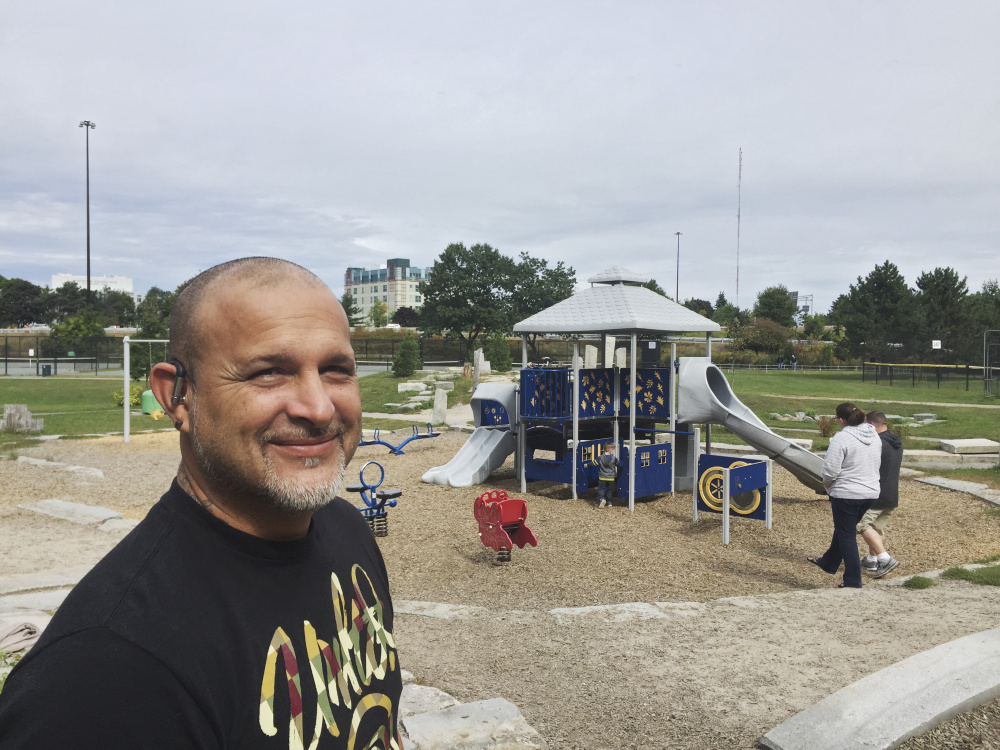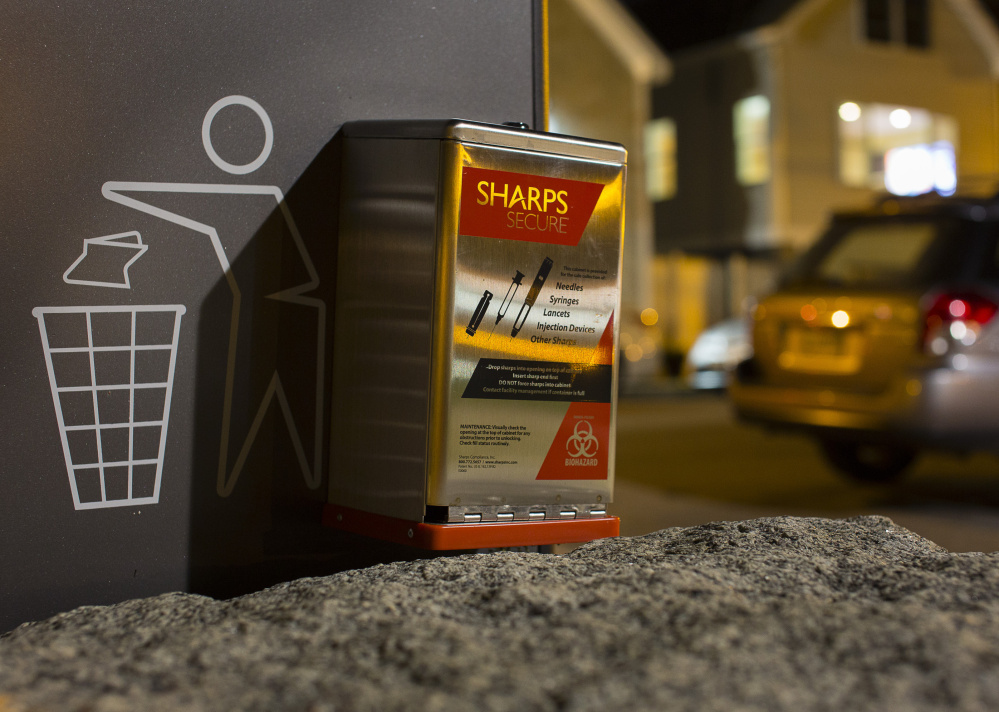Zeke Villarreal of Portland said he’s been bringing his son to the Deering Oaks playground for five years, since the boy was a year old, and has found needles on four occasions.
When he saw that the city had added a syringe and needle receptacle near the playground, he thought it made sense – though he understands why some parents might find it disconcerting.
“The fact is, they’re here,” he said Tuesday of drug users. “We can’t just turn a blind eye to it.”
Portland’s new collection receptacles for used syringes and needles haven’t gotten a lot of use in the week and a half since they were placed in city parks, but several parents at the Deering Oaks playground favored their addition.
The city’s Public Services Department placed the “sharps” receptacles at Deering Oaks, Harbor View Memorial and Peppermint parks as well as one near the corner of Chestnut and Lancaster streets. So far, just one needle has been collected, although city workers are called an average of once a day to pick up discarded, used needles in different locations.
The city installed the four receptacles, which are attached to trash bins, after stepping up patrols in the parks and after residents complained of finding drug use and discarded needles. Used needles can carry infectious diseases from the original user, the most common of which are Hepatitis B, Hepatitis C and HIV, according to the U.S. Food and Drug Administration.
The countermoves come at a time of alarming increase in heroin use.
The number of Mainers seeking treatment for opiate addiction more than tripled between 2010 and 2014, rising from 1,115 individuals to 3,463 last year, according to statistics from the Maine Office of Substance Abuse. Meanwhile, heroin overdose deaths rose from seven in 2009 to 57 in 2014. Including fentanyl, Maine had 100 heroin or fentanyl overdose deaths in 2014, and 63 through June 30 of this year.
Lately, several police departments in Maine have signed on to efforts to redirect addicts into treatment as a way to reduce the amount of heroin use, though treatment advocates say there are far too few treatment spots in Maine for the people who need them.
Villarreal, who lives in Portland’s Parkside neighborhood, does a sweep of the playground when he first arrives there, looking for syringes, which often have a bright orange cap that might attract the attention of a child. He also credits the city with sending workers out first thing in the morning to check the park for dangerous debris. He discourages parents from letting their children run barefoot.
Villarreal said he spent time in Europe while serving in the military, and the needle receptacles were the kind of progressive thinking he found there.
Adding the syringe receptacles made sense to several parents who brought their toddlers to play at the Deering Oaks playground Tuesday morning.
“I’d rather have it here and not need it, than need it and not have something,” said Holly So of Gorham as she watched over her 2-year-old.
Lenka Wieluns, who was visiting with her 2-year-old, said she hasn’t seen needles on the ground at the park, but has heard about it happening. She appreciates the effort to make a receptacle available but believes they won’t be used often, because she doesn’t think the people using the needles would care much about the places where they use them.
“Do you think the people using the needles will actually dispose of them?” Wieluns said. “My thought is it wouldn’t matter to them.”
Bob Wassick, training and safety administrator for the city’s Public Services Department, said the receptacles aren’t getting a lot of use yet. The lone needle that was found in a receptacle was at Harbor View Park, he said.
Wassick or one of the other people trained to safely collect and dispose of needles are called, on average, once a day, sometimes for a single needle, but sometimes for half a dozen. In Deering Oaks, he said, they usually are not found near the playground but near trees where users loiter, or outside the portable toilets.
Wassick believes not all the needles are being used by addicts. People with diabetes use needles to inject themselves, he said.
The city’s needle exchange program provides clean needles but only in exchange for a used needle that is turned in, so a regular user has an incentive to keep the drug paraphernalia until he is ready to exchange it.
Wassick said that because just one needle was collected in the first 10 days among four containers, he plans to check them once a week. He said each receptacle can hold 20 or so, and they are built to be secure and inaccessible to anyone who is not authorized to open them.
Wassick said he does not know of other cities putting needle disposal boxes in parks, though he said he had heard that Burlington, Vermont, was considering it. A program in Vancouver, British Columbia, has placed syringe receptacles in public parks, though cities more often locate them near clinics, pharmacies and police and fire stations, according to the FDA.
The public can dispose of found needles in the receptacles, but Wassick encouraged members of the public to call the city at 874-8493 to report a needle, rather than picking it up themselves, to ensure someone who is trained and up to date on vaccinations can take care of it.
Send questions/comments to the editors.



